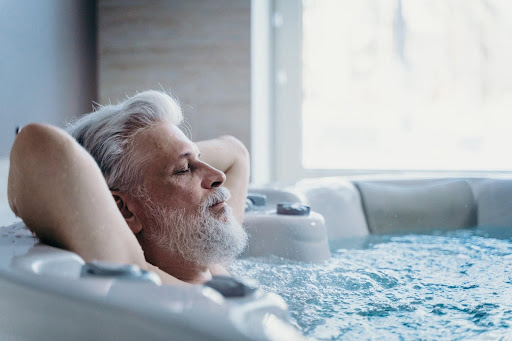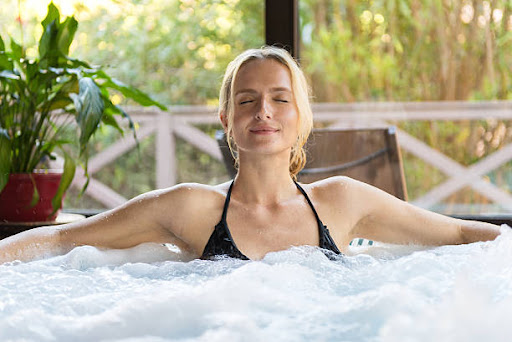Mental Health Benefits of Hot Tubs
Why Mental Relaxation Stress Hormonal Mood Pain Outdoors Yourself Socializing Tips Summary

In the world today, it is more important than ever to focus on mental health. With so much stress and negativity, it can be challenging to stay cheerful and well. That's where hot tubs come in!
There are plenty of hot tubs, and sometimes it isn't easy to choose the best one. ByRossi will help you with your decision. Many reviews from professional experts provide helpful information on selecting, installing, and using these devices.
In the article, we collected the essential mental health benefits and have valuable tips on how to get the most out of your hot tub sessions.
Why use hot tubs?
Hot tubs have become very popular, so the benefits have been studied more closely. There is a significant impact on our health, both physical and mental. It reduces muscle and joint pain, benefits cardiovascular health, decreases inflammation, and helps detoxify the body. But the main thing is relaxation.
Mental health benefits
Mental health is a broad term that covers our emotional, psychological, and social well-being. It affects our feelings, thoughts, and interactions with other people. We all have it, and it changes over time. Just like our physical health, taking care of our mental health is essential. You can use the hot tub to do this. Below you can find all benefits of a jacuzzi for your mental state.
Relaxation
The first and most apparent benefit of hot tubs is relaxation. If you have a lot of stress, it can be challenging to find time to relax. Jacuzzi provides a perfect way to unwind from the daily routine. You can also use them to relax before bedtime or during the day if you need a break. When you immerse your body in hot water, muscles relax, and your blood vessels dilate. In addition, the water's heat can help increase blood flow and circulation throughout your body. The combination of these factors can lead to a feeling of deep relaxation.

Reduce stress and anxiety
Stress and anxiety can profoundly affect our mental health, causing everything from mild discomfort to severe conditions like depression and PTSD. Fortunately, the pleasure from the warm water and the massage with jets can help ease muscle tension and headaches. Soaking in a hot tub before your bedtime can also promote better sleep. For many people, hot tub sessions can be a relaxing and therapeutic experience that can help take the edge off a long day or week. If you suffer from chronic stress or anxiety, spending time in a hot tub may be an effective way to help you manage your symptoms and feel more relaxed.
Hormonal re-balance
One of the main ways hot tubs help with stress is by increasing serotonin levels in the brain. It is often referred to as the "happy hormone" because it helps to regulate mood, sleep, and appetite. So, if you're feeling stressed or down, a dip in the hot tub could be just what you need to boost your mood.
There is a suggestion that hot tubs can help to reduce cortisol levels. It is well-known as the "stress hormone" because it increases when in a stressful situation. High cortisol levels have been linked to many health conditions, including overweight, high blood pressure, and anxiety. So, if you can reduce it with a hot tub, you may enjoy some profound health benefits.
There are a lot of nerve endings in the skin, and when you immerse yourself in hot water, it can stimulate the release of oxytocin. It is sometimes called the "cuddle hormone" or the "love hormone" because it plays a role in social bonding, sexual reproduction, and childbirth. It's also been shown to have anti-anxiety and stress-relieving effects. So spending some time in a hot tub could help you feel calm.
Improves overall mood
It's no secret that one of the benefits of hot tubs is improved circulation. Blood flow increases when your body is relaxed, and your muscles are loose. It can have a positive effect on your overall mood because of endorphins. They are hormones released by the brain in response to pain or stress and have mood-boosting effects. They act as natural painkillers and can also produce feelings of euphoria. That's why soaking in a hot tub can help to elevate your mood and leave you feeling happier overall.
Mental reprieve from physical pain
Hot tubs can serve as an immense mental respite from chronic physical pain. They provide a form of hydrotherapy, which is known to ease muscular tension and pain, as well as improve circulation. It can be highly beneficial for those who have arthritis, fibromyalgia, and chronic back pain. The weightlessness that comes from floating in water can also help take pressure off of painful joints and muscles. The buoyancy of the water helps support the body and takes away the force of gravity that can cause pain. It can allow relaxing fully, may even provide temporary relief from chronic pain symptoms, and will enable you to focus on other things.
Spend more time outdoors
The fast pace of life and work routine does not allow us to spend enough time in the fresh air. But one of the best things you can do for your mental health is to pass away more time outdoors. And what better way to do that than by relaxing in a hot tub? Nature has a way of calming and comforting us, which can help to reduce stress and anxiety levels. You will get some fresh air, sunshine, and the benefits of warm water. Hot tubs are the perfect way to enjoy some time outside while still being able to relax and de-stress. Also, it will help you be more productive and focused on doing your job well.
Opportunity to think about yourself
In the adult world, we have loved ones to take care of, responsibilities, and problems to solve. But our mental health needs to take care of ourselves. A hot tub gives us this opportunity to spend time alone. You can make some facials, give yourself a please in hot tub bubbles and read your favorite book. Or it's a great time to think about your wishes and plans for the future. All these things can help you increase self-esteem, feel more confident and reduce the stress connected with your life.

Socializing
Socializing can have a positive impact on mental health. Interacting with others can protect you from developing depression and anxiety. Socializing in a hot tub can provide an opportunity to connect with others without the pressure of face-to-face interaction. The relaxed setting can also help ease social anxiety. If you have friends or family members who also enjoy soaking in hot tubs, invite them over for a session! You can catch up on gossip, share stories, and enjoy each other's company. If you don't know anyone with a jacuzzi, consider joining a local hot tub club or renting a tub for a party. If you're feeling stressed, consider soaking in a hot tub with friends or family members to help reduce your stress levels.
Helpful tips for better results
If you're considering using a hot tub for mental health benefits, you can do a few things to make sure you get the most out of your experience. Here are some tips:
- Talk to your doctor first. If you have any underlying medical conditions that heat or water may affect you, it's important to get clearance from a physician before using a hot tub.
- Start slowly. Take it easy if it's your first time in a hot tub or if you haven't been in one recently. Spend no more than 20 minutes in the tub and gradually increase your time as your body adjusts.
- Keep cool outside the tub. It's essential to keep your body temperature low when you're not in the tub, so be sure to drink plenty of fluids and avoid overheating.
- Use a neck pillow or rolled towel to relieve tension headaches to support your head and neck.
- Try aromatherapy. Essential oils can create a relaxing atmosphere and spa effect.
- Make sure the water is at a comfortable temperature. You don't want it to be too hot or too cold.
- Play some calming music in the background or lighting to set a relaxing mood.
- Find the time when you can relax and not be interrupted. It means turning off your phone and other devices that might distract you.
- Take some deep breaths and focus on letting go of your stress and tension.
- Take breaks as needed. If you start to feel dizzy, lightheaded, or uncomfortable in any way, take a break from the hot tub and cool down. Never push yourself too far.
Summary
The mental health benefits of hot tubs are often overlooked. While the physical benefits are well-known and widely advertised, the mental health benefits are not as commonly discussed. It is likely because it is seen as a more taboo topic and more complicated to measure than physical health. However, this does not mean that the mental health benefits of hot tubs are any less real or meaningful. They are many and varied, but they all center around one crucial thing: relaxation. We tried to explore some ways that hot tubs can benefit your mental state, as well as pieces of advice to make the process more advantageous. Use them to improve your well-being and feel happy.
Thank you Peter Rossi for contributing this article.
Mental Health and Support Articles
From Mental Health Benefits Of Hot Tubs to Home
Recent Articles
-
Common Truck Crash Injuries and Legal Remedies - Caregiverology
Jul 19, 25 10:49 AM
Known for its sun-drenched beaches, vibrant arts scene, and bustling maritime industry, Fort Lauderdale is a city that sees heavy traffic both on its roads and at its busy port. Unfortunately, with th… -
Why Expert Legal Help Matters After Serious Injury - Caregiverology
Jul 19, 25 10:35 AM
In Houston, over 67,600 car crashes occurred in 2023, resulting in 290 fatalities and 1,612 serious injuries. That’s roughly 185 accidents every day. -
How Life Care Planners Support Injury Recovery - Caregiverology
Jul 19, 25 10:18 AM
In Los Angeles, life care planners play a vital role in supporting injury recovery, especially for individuals facing catastrophic injuries such as traumatic brain injuries or spinal cord damage.





New! Comments
Have something to say about what you just read? Leave a comment in the box below.